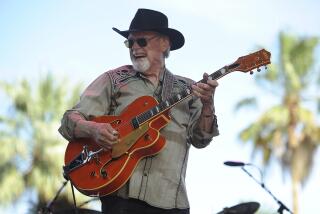Martin Denny, 93; Created Tiki Sound
- Share via
Martin Denny, who recorded 38 albums that defined a genre of tropical mood music dubbed “exotica,” which reflected tiki lounge culture, died Wednesday in Honolulu, his daughter said. He was 93.
Denny created a sound that he described as a fusion of Asian, South Pacific, American jazz, Latin American and classical music. His relaxing compositions were frequently punctuated by wildlife nature sounds.
Denny’s original “Exotica” album was recorded in 1956. Several albums by Denny played off that record’s theme, such as “Exotic Sounds from the Silver Screen,” “Exotic Sounds Visit Broadway,” “Exotic Percussion” and “Exotica Classica.”
His other albums include “Forbidden Island,” “Primitiva,” “Hypnotique,” “Afro-Desia,” “The Enchanted Sea,” “Romantica” and “Hawaii Goes A-Go-Go!”
Born April 10, 1911, in New York City, Denny studied piano as a child and as a young man toured South America with a six-piece band, picking up the Latin elements that would later influence his exotica sound.
He served in the Army Air Forces during World War II, and after his discharge, he studied at the Los Angeles Conservatory of Music. He moved to Hawaii in 1954 to work at Don the Beachcomber’s restaurant on Waikiki Beach. Except for a few years in Beverly Hills, he lived in Hawaii the rest of his life.
It was at Don the Beachcomber’s that Denny got together with vibraphonist Arthur Lyman and bassist John Kramer to play jazz. The trio got a record contract in 1955, and bongo player Augie Colon joined the group the following year. Denny soon began writing tunes to take advantage of Colon, and the music that resulted also incorporated what he had heard in South America and elsewhere.
Colon did the birdcalls heard on Les Baxter’s “Quiet Village,” a Top 40 hit in 1959. Denny’s recording of the tune, with its birdcalls and frog sounds in the background, came about when the band was playing at Honolulu’s Shell Bar, which had no walls. The band at first mimicked the wildlife as a joke, but audiences loved it, and it was soon added to the performance.
Denny’s music was rediscovered by a new generation of fans in the 1990s, when most of his early catalog was reissued on CD.
In addition to his daughter, Christina Denny, he is survived by a sister, Judith Kane, of Sherman Oaks.
More to Read
The biggest entertainment stories
Get our big stories about Hollywood, film, television, music, arts, culture and more right in your inbox as soon as they publish.
You may occasionally receive promotional content from the Los Angeles Times.










